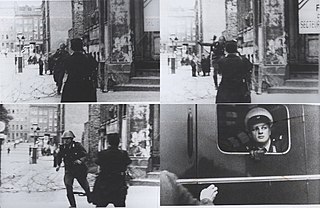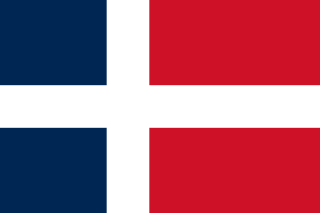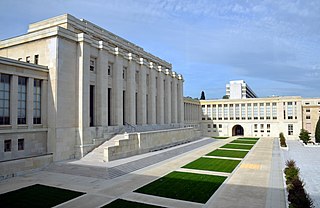IRO, Iro, or iro may refer to:
The United Nations High Commissioner for Refugees (UNHCR) is a United Nations agency mandated to aid and protect refugees, forcibly displaced communities, and stateless people, and to assist in their voluntary repatriation, local integration or resettlement to a third country. It is headquartered in Geneva, Switzerland, with over 18,879 staff working in 138 countries as of 2020.

United Nations Relief and Rehabilitation Administration was an international relief agency, largely dominated by the United States but representing 44 nations. Founded in November 1943, it was dissolved in September 1948. it became part of the United Nations in 1945. Its purpose was to "plan, co-ordinate, administer or arrange for the administration of measures for the relief of victims of war in any area under the control of any of the United Nations through the provision of food, fuel, clothing, shelter and other basic necessities, medical and other essential services". Its staff of civil servants included 12,000 people, with headquarters in New York. Funding came from many nations, and totalled $3.7 billion, of which the United States contributed $2.7 billion; Britain, $625 million; and Canada, $139 million.

The International Organization for Migration (IOM) is the principal United Nations agency working in the field of migration. The organization implements operational assistance programmes for migrants, including internally displaced persons, refugees, and migrant workers.

A refugee, conventionally speaking, is a person who has lost the protection of their country of origin and who cannot or is unwilling to return there due to well-founded fear of persecution. Such a person may be called an asylum seeker until granted refugee status by the contracting state or the United Nations High Commissioner for Refugees (UNHCR) if they formally make a claim for asylum.
Palestinian refugees are citizens of Mandatory Palestine, and their descendants, who fled or were expelled from their country over the course of the 1947–1949 Palestine war and the Six-Day War. Most Palestinian refugees live in or near 68 Palestinian refugee camps across Jordan, Lebanon, Syria, the West Bank and the Gaza Strip. In 2019 more than 5.6 million Palestinian refugees were registered with the United Nations.

The International Rescue Committee (IRC) is a global humanitarian aid, relief, and development nongovernmental organization. Founded in 1933 as the International Relief Association, at the request of Albert Einstein, and changing its name in 1942 after amalgamating with the similar Emergency Rescue Committee, the IRC provides emergency aid and long-term assistance to refugees and those displaced by war, persecution, or natural disaster. The IRC is currently working in about 40 countries and 26 U.S. cities where it resettles refugees and helps them become self-sufficient. It focuses mainly on health, education, economic wellbeing, power, and safety.

The United Nations System consists of the United Nations' six principal bodies, the Specialized Agencies and related organizations. The UN System includes subsidiary bodies such as the separately administered funds and programmes, research and training institutes, and other subsidiary entities. Some of these organizations predate the founding of the United Nations in 1945 and were inherited after the dissolution of the League of Nations.

The Saar Protectorate, officially Saarland, was a French protectorate and a disputed territory separated from Germany. On joining the Federal Republic of Germany in 1957, it became the smallest "federal state", the Saarland, not counting the "city states" of Berlin, Hamburg, and Bremen. It is named after the Saar River.

Displaced persons camps in post–World War II Europe were established in Germany, Austria, and Italy, primarily for refugees from Eastern Europe and for the former inmates of the Nazi German concentration camps. A "displaced persons camp" is a temporary facility for displaced persons, whether refugees or internally displaced persons. Two years after the end of World War II in Europe, some 850,000 people lived in displaced persons camps across Europe, among them Armenians, Czechoslovaks, Estonians, Greeks, Poles, Latvians, Lithuanians, Yugoslavs, Jews, Russians, Ukrainians, Hungarians, and Belarusians.

Danish Refugee Council (DRC) is a private Danish humanitarian nonprofit organization, founded in 1956. It serves as an umbrella organization for 33 member organizations.

The United Nations Office at Geneva in Geneva, Switzerland, is one of the four major offices of the United Nations where numerous different UN agencies have a joint presence. The main UNOG administrative offices are located inside the Palais des Nations complex, which was originally constructed for the League of Nations between 1929 and 1938.

The Boy Scouts of the United Nations existed from 1945 through perhaps the early 1980s as the Scouting association serving the families of diplomats and staff of the United Nations, active in both Geneva and at Parkway Village in New York. The organization sponsored groups in India, Lebanon and Cyprus and had ties to the International Boy Scouts of the Canal Zone.

The Palestinian right of return is the political position or principle that Palestinian refugees, both first-generation refugees, as well as their descendants, have a right to return and a right to the property they themselves or their forebears left behind or were forced to leave in what is now Israel and the Palestinian territories, as part of the 1948 Palestinian expulsion and flight, a result of the 1948 Palestine war, and due to the 1967 Six-Day War.
Scouting has been active in displaced persons camps and in the lives of refugees since World War I. During and after World War II, until the early 1950s, Scouting and Guiding flourished in these camps. These Scout and Girl Guide groups often provided postal delivery and other basic services in displaced persons camps. This working system was duplicated dozens of times around the world. In the present, Scouting and Guiding once again provide services and relief in camps throughout war-torn Africa.

An international organization, also known as an intergovernmental organization or an international institution, is an organization that is established by a treaty, or is an instrument governed by international law and possessing its own legal personality, such as the United Nations, the World Health Organization, International Union for Conservation of Nature, and NATO. International organizations are composed of primarily member states, but may also include other entities, such as other international organizations, firms, and nongovernmental organizations. Additionally, entities may hold observer status. An alternative definition is that an international organization is a stable set of norms and rules meant to govern the behavior of states and other actors in the international system.
United Nations General Assembly Resolution 48/144 of 20 December 1993 is a resolution in which the General Assembly expressed its concern at the ongoing degradation of the humanitarian situation in Azerbaijan because of the displacement of considerable number of citizens due to Nagorno Karabakh conflict and supporting "emergency international assistance to refugees and displaced persons in Azerbaijan". The resolution is titled “48/114. Emergency international assistance to refugees and displaced persons in Azerbaijan”. It became the fifth United Nations document concerning Nagorno-Karabakh and the first United Nations General Assembly document on humanitarian aid to those affected by this conflict. This resolution was the first international document affirming the number of refugees and displaced persons in Azerbaijan exceeded one million. The document does not make any specific reference to previous UN resolutions on the ongoing conflict, but "its relevant resolutions regarding humanitarian assistance to refugees and displaced persons". The resolution was adopted by consensus without voting.
Louise Wilhelmine Holborn was a German-American political scientist. She was a professor at Connecticut College from the late 1940s until 1970. She specialized in the politics of refugees and migration, conducting a number of studies on the topic for organizations like the United Nations, and she was also an advocate for refugees.











